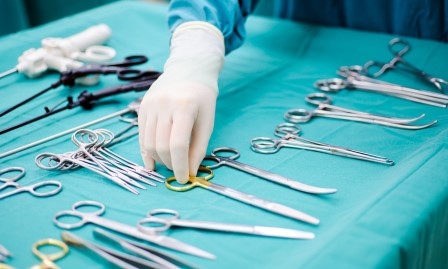Certification Board for Sterile Processing and Distribution CBSPD Preparatory Course
Program Duration: 3 days
Training Method: Online Live Interactive Training
About Program:
The CBSPD certification programs aim to recognize individuals who meet measurable, competency-based standards, providing a benchmark for professionals in the field. This preparatory course is designed to equip candidates with the essential knowledge and skills needed to excel in the CBSPD certification exam. By covering critical topics aligned with the CBSPD exam content outline, our program ensures participants are fully prepared to meet the high standards of the certification process and effectively work as CSSD professionals.
The CBSPD offers five certification levels: Technician, Flexible Endoscope Reprocessor, Ambulatory Surgery Technician, Surgical Instrument Specialist, and Management. Each level’s examination is available four times a year.
Program Objectives:
- To ensure safe and effective levels of practice to protect the public.
- To promote the education of healthcare sterile processing and flexible endoscope processing personnel, through certification to ensure safe and effective levels of practice to protect the public.
- To encourage continuing education for those individuals working in the healthcare sterile processing and flexible endoscope processing professions.
- To encourage re-certification by those individuals previously recognized as certified.
- To maintain a publicly accessible certification registry of healthcare sterile processing and flexible endoscope
Program outlines:
- Decontamination
- Cleaning and decontaminating instruments to remove biohazards.
- Use of ultrasonic cleaners, automated washers, and manual cleaning methods.
- Infection control measures and safety practices for handling contaminated items.
- Understanding of hospital-grade disinfectants and their applications.
- Preparation and Packaging
- Inspecting instruments for damage and wear.
- Assembling instrument sets and ensuring proper configuration.
- Packaging techniques for sterilization, including wraps, pouches, and rigid containers.
- Proper labeling of instrument sets and packaging for traceability.
- Sterilization
- Different sterilization methods: steam, ethylene oxide (EtO), hydrogen peroxide, and dry heat.
- Biological, chemical, and mechanical indicators used for monitoring sterilization.
- Sterilization cycles, parameters, and troubleshooting.
- Understanding sterilization equipment, including autoclaves, and their maintenance.
- Storage and Distribution
- Proper storage techniques for sterile instruments to maintain sterility.
- FIFO (First In, First Out) method for managing inventory.
- Temperature, humidity, and environmental factors that affect sterile storage.
- Safe transportation and handling of sterile items within the hospital or clinical setting.
- Instrumentation
- Identification of surgical instruments and their functions.
- Proper handling and care of both reusable and disposable instruments.
- Maintenance, cleaning, and inspection of instrumentation.
- Specialized instruments used in surgery (e.g., robotic, minimally invasive tools).
- Microbiology and Infection Control
- Role of microorganisms, including bacteria, viruses, and spores, in healthcare settings.
- The process of biofilm formation and its impact on sterilization.
- Key infection control measures to prevent contamination during the decontamination process.
- Understanding of pathogenic organisms and their resistance to sterilization methods.
- Professional Responsibilities
- Ethical and professional standards for sterile processing technicians.
- Adherence to regulatory guidelines, such as AAMI, CDC, and OSHA.
- Compliance with hospital policies and safety procedures.
- Importance of maintaining accurate records for traceability and accountability.
- Management of Sterile Processing Operations
- Leadership skills in managing a Central Sterile Supply Department (CSSD).
- Workflow optimization strategies to improve efficiency and reduce errors.
- Resource management, including staffing, equipment, and inventory control.
- Quality control, audits, and compliance with accreditation standards (e.g., JCAHO).
- Mock Exam for CBSPD Certification
Program Includes:
- Program PPT and Educational Material
- CBSPD References Books
- CBSPD Mock Exam
- Certificate of Professional Development by CPD, UK London
- 12 CPD /CME hours
*Face to Face for Group or in-House Training Available per request only in Riyadh, Jeddah, Dammam, Khobar, Abha, Dubai, Abu Dhabi, Kuwait, Qatar, Oman, Bahrain, Tbilisi.

